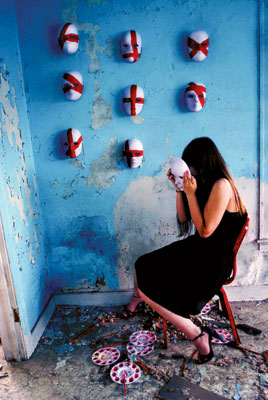All Nonfiction
- Bullying
- Books
- Academic
- Author Interviews
- Celebrity interviews
- College Articles
- College Essays
- Educator of the Year
- Heroes
- Interviews
- Memoir
- Personal Experience
- Sports
- Travel & Culture
All Opinions
- Bullying
- Current Events / Politics
- Discrimination
- Drugs / Alcohol / Smoking
- Entertainment / Celebrities
- Environment
- Love / Relationships
- Movies / Music / TV
- Pop Culture / Trends
- School / College
- Social Issues / Civics
- Spirituality / Religion
- Sports / Hobbies
All Hot Topics
- Bullying
- Community Service
- Environment
- Health
- Letters to the Editor
- Pride & Prejudice
- What Matters
- Back
Summer Guide
- Program Links
- Program Reviews
- Back
College Guide
- College Links
- College Reviews
- College Essays
- College Articles
- Back
Cultural Identity Through My Name(s) MAG
She fumbled with a rhinestone button on her purple cardigan, and then brought the pen cap to her mouth before breaking the silence.
“Dongeun?” she said, waiting for a hand to shoot up in the air. I raised my arm halfway and said, quietly,
“Here.
“You can just call me Jane,” I added loudly.
“That makes things a lot easier,” the substitute teacher muttered, marking a check next to my name.
Dongeun, pronounced Dong-Un, is the first name printed on my Louisiana birth certificate, my passport, and the school roll-call sheet. I've heard many variations of my name, including my favorite, Don-Joon, which makes me sound French.
The name, which is rare even in Korea, means “a hill of the East.” It's a hill I abandoned when the other kids giggled at its sound the first day of fourth grade, when I moved to California. I quickly reintroduced myself by blurting out the only American name I knew. Thus, “Jane” was born.
As Jane, I felt a sense of belonging with a group of blonde-haired, blue-eyed peers. I packed turkey sandwiches for lunch instead of rice, even though my stomach growled for Korean food. I walked around the house in my dirty shoes, ignoring the footprints staining the clean carpet. The more I assimilated into the American culture, the less I appreciated my own. Together with my Korean name, Korean culture became one big blur.
Last summer, I was one of a hundred Americans selected by the Korea Foundation to travel to South Korea as part of a cultural exchange. During two weeks of living in a traditional village house, I learned how to perform Korean mask dancing, make kimchi and kimbop, and defend myself through taekwondo. I also gained lifelong friendships and an appreciation for my parents' home country.
I came home with a new desire to plunge into the 5,000-year-old Korean history, sound the elaborate curves of the Korean language, and feel the silky texture of its traditional dress, Hanbok. Luckily, I didn't have to search far to satisfy these wishes. My parents, the ones who still call me Dongeun, have always been more than happy to teach me about Korea.
Since the trip, I've learned to live in two cultures. At home, I speak Konglish, a vague mixture of Korean and English. I greet friends with a “Hello” and wave my hand, and address Korean adults with “Anyong,” bowing my head. In November, my family celebrates Thanksgiving and Chusuk with a dinner table piled with turkey, yams, kimchi, and bulgogi. I speak at the International House about my Korea experience, serving as an ambassador to inform people about Korean culture.
Yesterday, when I saw a substitute teacher in class, my palms didn't sweat and my heart didn't race. Instead, when she butchered my name, I politely corrected her, loudly and clearly: “Please call me Dongeun. It's my Korean name.”

Similar Articles
JOIN THE DISCUSSION
This article has 1 comment.

35 articles 0 photos 1398 comments
Favorite Quote:
The future belongs to those who believe in the beauty of their dreams.<br /> --Eleanor Roosevelt